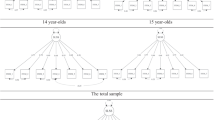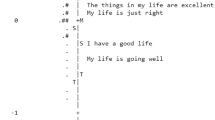Abstract
A total of 183 elementary school students were administered the Self-Description Questionnaire-1 (SDQ-1) and the Students' Life Satisfaction Scale (SLSS) in order to explore the relationships between self-concept domains and global life satisfaction in pre-adolescent children. Results suggested that children differentiate global life satisfaction from self-concept domains. Also, SDQ-1 domains related differentially to SLSS ratings. Consistent with findings with adolescents (Dew and Huebner, 1994), the Parent Relations domain was the strongest predictor of global life satisfaction for these pre-adolescents. The findings provide additional support for the meaningfulness of the life satisfaction construct with children as well as the multidimensionality of children's subjective well-being.
Similar content being viewed by others
References
Adelman, H. S., L. Taylor, and P. Nelson: 1989, ‘Minors' dissatisfaction with their life circumstances’, Child Psychiatry and Human Development 20, pp. 135–147.
Argyle, M.: 1987, The Psychology of Happiness (Routledge, London).
Bracken, B.: 1992, ‘Examiners’ Manual for the Multidimensional Self-Concept Scale (Pro-Ed, Austin, TX).
Campbell, A.: 1981, The Sense of Well-being in America: Recent Patterns and Trends (McGraw-Hill, New York).
Chamberlain, K.: 1988, ‘On the structure of well-being’, Social Indicators Research, 20, pp. 581–604.
Coopersmith, S.: 1981, Self-Esteem Inventory (Palo Alto, Consulting Psychologists Press, CA).
Crain, R. M. and B. A. Bracken: 1994, ‘Age, race, and gender differences in child and adolescent self concept: evidence from a nine year cross-sectional study’, School Psychology Review 23, pp. 496–511.
Dew, T. and E. S. Huebner. 1994, ‘Adolescents' perceived quality of life: an exploratory investigation’, Journal of School Psychology 32, pp. 185–199.
Diener, E.: 1984, ‘Subjective well-being’, Psychological Bulletin, 95, pp. 542–575.
Diener, E. and R. J. Larsen: 1993, ‘The experience of emotional well-being’, in M. Lewis and J. M. Haviland (eds.), Handbook of Emotions (Guilford, New York), pp. 405–415.
Diener, E. and M. Diener: 1994, ‘Cross-cultural correlates of life satisfaction and self-esteem’, manuscript submitted for publication.
Diener, E., R. A. Emmons, R. Larsen, and S. Griffin: 1985, ‘The satisfaction with life scale’, Journal of Personality Assessment 49, pp. 91–95.
Frisch, M. B., J. Cornell, M. Villanueva, and P. J. Retzlaff: 1992, ‘Clinical validation of the Quality of Life Inventory: a measure of life satisfaction for use in treatment planning and outcome assessment’, Psychological Assessment 4, pp. 92–101.
Harter, S.: 1982, ‘The perceived competence scale for children’, Child Development 53, pp. 87–97.
Harter, S.: 1989, ‘Causes, correlates, and the functional role of global self-worth: a life-span perspective’, in J. Kolligan and R. Stemberg (eds.), Perceptions of competence and Incompetence Across the Life Span, (Yale University Press, New Haven, CT), pp. 67–97.
Huebner, E. S.: 1991a, ‘Initial development of the students' life satisfaction scale’, School Psychology International 12, pp. 231–240.
Huebner, E. S.: 1991b, ‘Correlates of life satisfaction in children’, School Psychology Quarterly 6, pp. 103–111.
Huebner, E. S.: 1991c, ‘Further validation of the students' life satisfaction scale: the independence of satisfaction and affect ratings’, Journal of Psychoeducational Assessment 9, pp. 363–368.
Huebner, E. S.: 1994, ‘Preliminary development and validation of a multidimensional life satisfaction scale for children’, Psychological Assessment 6, pp. 149–158.
Huebner, E. S. and G. Alderman: 1993, ‘The students' life satisfaction scale: its relationship to self-and teacher-reported psychological problems and school functioning’, Social Indicators Research 30, pp. 71–82.
Huebner, E. S. and T. Dew: 1993, ‘Validity of the perceived life satisfaction scale’, School Psychology International 14, pp. 355–360.
Marsh, H. W.: 1990, Self-Description Questionnaire 1-Manual (University of Western Sydney, Campbelltown NSW Australia).
Marsh, H. W., J. S. Relich, and I. D. Smith: 1983, ‘Self-concept: the construct validity of interpretations based upon the SDQ’, Journal of Personality and Social Psychology 45, pp. 173–187.
Michalos, A. C.: 1980, ‘Satisfaction and happiness’, Social Indicators Research 8, pp. 385–427.
Myers, D. G.: 1992, The Pursuit of Happiness: Who is Happy and Why (William Morrow and Company, New York).
Pavot, W., E. Diener, D. R. Colvin, and E. Sandvik: 1991, ‘Further validation of the satisfaction with life scale: evidence for cross-method convergence of well-being measures’, Journal of Personality Assessment 57, pp. 149–161.
Ryff, C. D.: 1989, ‘Happiness is everything, or is it? explorations on the meaning of psychological well-being’, Journal of Personality and Social Psychology 57, pp. 1069–1081.
Shavelson, R., J. J. Hubner, and G. C. Stanton: 1976, ‘Self-concept: validation of construct interpretations’, Review of Educational Research 46, pp. 407–441.
Shin, D. C. and D. M. Johnson: 1978, ‘Avowed happiness as an overall assessment of the quality of life’, Social Indicators Research 5, pp. 475–492.
Veenhoven, R.: 1984, Conditions of happiness (Kluwer Acacademic Publishers, Hingham, MA).
Veenhoven, R.: 1991, World Database of Happiness (Available from Ruut Veenhoven, Erasmus University Rotterdam, Faculty of Social Sciences, RISBO, P. O. Box 1738, 3000DR Rotterdam, The Netherlands).
Wilson, W.: 1967, ‘Correlates of avowed happiness’, Psychological Bulletin 67, pp. 294–306.
Wolfe, V. V., A. J. Finch, C. F. Saylor, R. L. Blount, T. P. Pallmeyer, and D. J. Carek: 1987, Journal of Consulting and Clinical Psychology 55, pp. 245–250.
Author information
Authors and Affiliations
Rights and permissions
About this article
Cite this article
Terry, T., Scott Huebner, E. The relationship between self-concept and life satisfaction in children. Soc Indic Res 35, 39–52 (1995). https://doi.org/10.1007/BF01079237
Accepted:
Issue Date:
DOI: https://doi.org/10.1007/BF01079237




